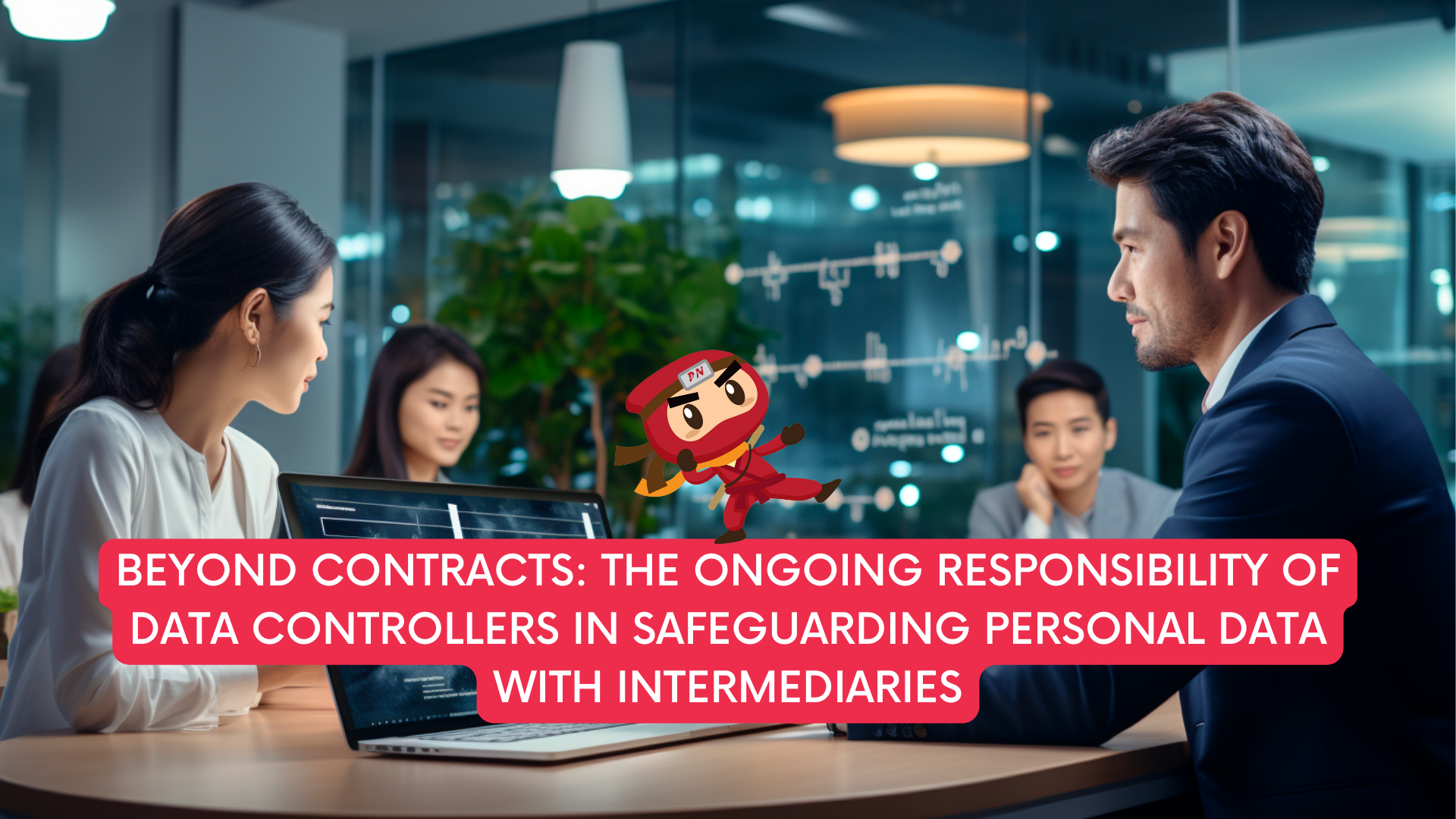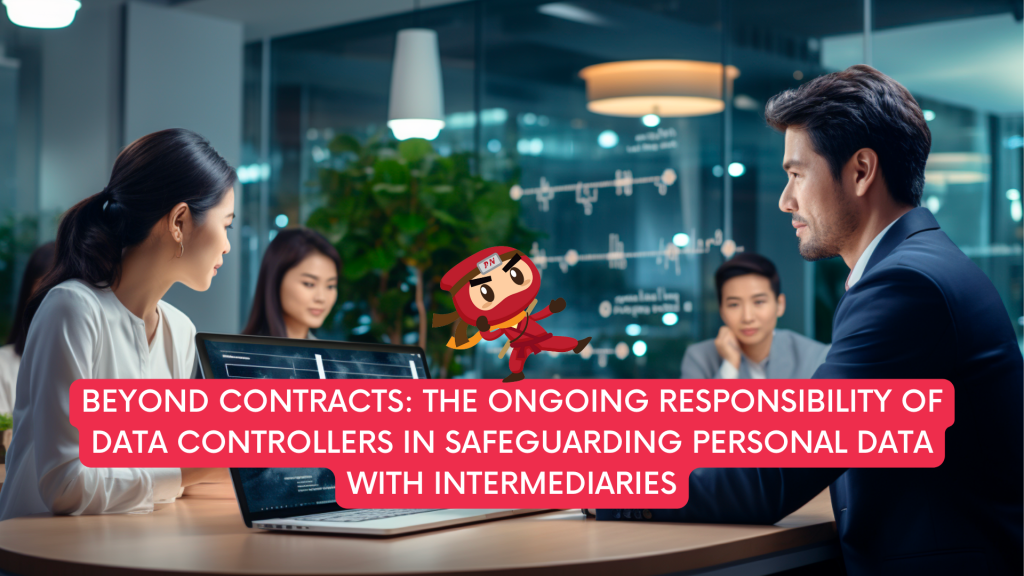KEEP IN TOUCH
Subscribe to our mailing list to get free tips on Data Protection and Cybersecurity updates weekly!







The engagement of data intermediaries is a common practice, often facilitated by detailed contractual agreements. However, in the context of data protection, organisations, known as Data Controllers, must recognize that a contractual framework alone does not absolve them of liability. Even with comprehensive contracts delineating the scope of work with vendors, Data Controllers bear the ongoing responsibility of exercising reasonable oversight to ensure the proper and secure handling of personal data.
Data intermediaries play a crucial role in the data processing ecosystem. These entities, often referred to as vendors or service providers, handle personal data on behalf of Data Controllers, providing specialized services ranging from cloud storage to data analytics. While detailed contracts establish the parameters of the engagement, they do not release Data Controllers from their ultimate responsibility for the data they entrust to these intermediaries.

Contracts between Data Controllers and intermediaries are vital documents that set the expectations, responsibilities, and obligations of each party. However, relying solely on contractual agreements may create a false sense of security. A contract, no matter how detailed, does not absolve Data Controllers from their duty to oversee and ensure compliance with data protection standards.
Data protection regulations, such as the Personal Data Protection Act (PDPA), place the primary responsibility on Data Controllers to safeguard personal data. Even with a robust contract in place, Data Controllers cannot delegate this responsibility entirely to intermediaries. They must actively engage in ongoing oversight to guarantee the proper and lawful processing of personal data.
Ongoing oversight involves a continuous and proactive approach to monitor the activities of data intermediaries. This includes regular assessments, audits, and communication to verify compliance with data protection regulations and contractual agreements. The essence of ongoing oversight lies in the vigilance of Data Controllers in ensuring that personal data is handled in accordance with the agreed-upon terms and legal requirements.
Data Controllers should establish clear protocols for monitoring and assessing the activities of data intermediaries. This may involve regular audits of data security practices, compliance checks with contractual obligations, and assessments of the overall data processing environment. The goal is to identify and address any potential risks or deviations promptly.
Data protection regulations place a significant burden on Data Controllers to ensure compliance throughout the data processing lifecycle. Even if a vendor contract is in place, regulatory authorities still hold Data Controllers accountable for any mishandling or breaches of personal data. Regulatory expectations extend beyond contractual agreements, emphasizing the need for proactive measures to safeguard the rights and privacy of individuals.
The Personal Data Protection Act, for instance, requires Data Controllers to make reasonable security arrangements to protect personal data. This obligation is not fulfilled merely by entering into a contract but necessitates active oversight to verify that the agreed-upon security measures are consistently implemented and maintained by data intermediaries.
To effectively exercise ongoing oversight, Data Controllers should adopt best practices that align with regulatory expectations:
The relationship between Data Controllers and data intermediaries should be viewed as a collaborative partnership rather than a one-time transaction. While contracts set the initial framework, ongoing oversight transforms this partnership into a dynamic process that adapts to the evolving landscape of data protection and emerging risks.
Data Controllers and intermediaries should engage in transparent communication, fostering a shared commitment to data protection principles. Regular updates, feedback sessions, and collaborative efforts to enhance data security contribute to a resilient partnership that prioritizes the protection of personal data.
In conclusion, the engagement of data intermediaries is a common practice in the modern data landscape, often facilitated by detailed contracts. However, Data Controllers must recognize that their responsibilities extend beyond contractual agreements. The ongoing duty of exercising reasonable oversight is paramount to ensure the proper and secure handling of personal data entrusted to intermediaries.
By adopting best practices for ongoing oversight, establishing clear communication channels, and viewing the relationship as a collaborative partnership, Data Controllers can fulfill their regulatory obligations, mitigate risks, and uphold the trust and privacy of individuals in an era where data protection is of utmost importance.

Your appointed DPO can work with you on your PDPA compliance, ensuring that there will be policies in place to make sure that the handling of personal data is PDPA compliant.
A Data Protection Officer (DPO) oversees data protection responsibilities and ensures that organisations comply with the Personal Data Protection Act (PDPA). Furthermore, every Organisation’s DPO should be able to curb any instances of PDPA noncompliance as it is the officer responsible for maintaining the positive posture of an organisation’s cybersecurity.
DPOs complement organisations’ efforts to ensure that the organisation’s methods of collecting personal data comply with the PDPA. It also ensures that policies are set in place to make sure that there will be no instances of data breaches in the future.
Don’t wait any longer to ensure your organisation is PDPA compliant. Take our free 3-minute PDPA Compliance Self-audit checklist now, the same “secret weapon” used by our clients to keep them on track. Upon completion, we will send you the results so you can take the necessary action to protect your customers’ data. Complete the free assessment checklist today and take the first step towards protecting your customers’ personal data.